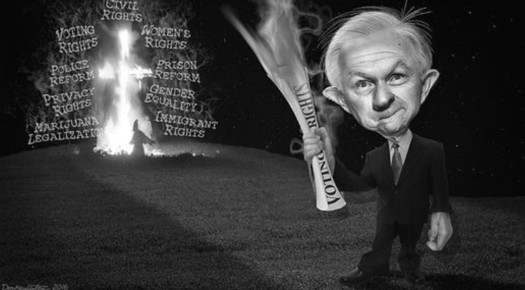
Trump’s Justice Department appeared in federal court Tuesday to argue that employers should be able to fire people because they are gay. Zarda v. Altitude Express case originated in 2010 when skydiving instructor Donald Zarda sued his former employer, Altitude Express, alleging he had been fired because of his sexual orientation. The judges are now expected to decide if the Title VII that protects against discrimination based on gender should also apply to discrimination based on sexual orientation.
Title VII of the Civil Rights Act of 1964 is a federal law that prohibits employers from discriminating against employees on the basis of sex, race, color, national origin, and religion. It generally applies to employers with 15 or more employees, including federal, state, and local governments.
“Employers under Title VII are permitted to consider employees’ out-of-work sexual conduct,” argued Hashim Mooppan, the Department of Justice attorney. “There is a commonsense, intuitive difference between sex and sexual orientation.” Another government agency, the Equal Employment Opportunity Commission, was in court to argue against the DOJ, saying gay employees are protected by Title VII. The Justice Department inserted itself into the case in July by filing a brief supporting the employer.
EEOC attorney Jeremy D. Horowitz seized the upper hand early by capably explaining the agency’s three theories - the “but-for” theory, the sex stereotyping theory and the associational sex discrimination theory – which show why “sexual orientation cannot be separated from sex.”
The strange thing is that two government agencies were on opposite sides in the court. Judge Rosemary Pooler couldn’t resist drawing his attention to the strangeness of the arguments. “We love to hear from the federal government,” she told Horowitz, “but it's a bit awkward to hear from them on both sides.”
The Equal Employment Opportunity Commission decided in 2015 that Title VII’s ban on sex discrimination does protect gay employees. Under President Barack Obama, the Justice Department took no position on this question.
In early September, the DOJ filed a brief in support of a Colorado cake maker who refused to make a wedding cake for a same-sex couple in 2012, citing freedom of religion and speech. The Supreme Court is expected to hear that case, Masterpiece Cake Shop v. Colorado Civil Rights Commission, this term. Both anti-gay briefs were startlingly incoherent, seemingly the product of political pandering rather than legal reasoning. Obviously the Department of Justice isn’t fan of gay people.
The federal judiciary didn’t accept the DOJ’s argument with open arms. It seems like everyone involved knows that there’s an anti-gay subtext here. Their efforts are directed towards empowering companies with the ability to discriminate at will.
Photo Credits: Wikimedia
